- <a href="https://library.nhrc.or.th/en" aria-label="home" class="mainMenu"> <em class="fas fa-home"></em> </a>
-
About Us
ย้อนกลับ About Us<a href="https://library.nhrc.or.th/en/history" aria-label="menu" class="submenu-list" target="_self"> History </a> <a href="https://library.nhrc.or.th/en/structure" aria-label="menu" class="submenu-list" target="_self"> Organization </a> <a href="https://library.nhrc.or.th/en/vision" aria-label="menu" class="submenu-list" target="_self"> Vision/Mission </a> <a href="https://library.nhrc.or.th/en/award" aria-label="menu" class="submenu-list" target="_self"> Awards </a> <a href="https://library.nhrc.or.th/en/announce" aria-label="menu" class="submenu-list" target="_self"> Regulation/Notification </a> Organizational PolicyGallery<a href="https://library.nhrc.or.th/en/website-policy" aria-label="menu" class="submenu-list"> Website Policy </a> <a href="https://library.nhrc.or.th/en/website-security-policy" aria-label="menu" class="submenu-list"> Website Security Policy </a> <a href="https://library.nhrc.or.th/en/personal-information-protection-policy" aria-label="menu" class="submenu-list"> Personal Information Protection Policy </a> <a href="https://library.nhrc.or.th/en/privacy-policies" aria-label="menu" class="submenu-list"> Privacy Policy </a> <a href="https://library.nhrc.or.th/en/terms-of-service" aria-label="menu" class="submenu-list"> Terms of Service </a> <a href="https://library.nhrc.or.th/en/cookies-policy" aria-label="menu" class="submenu-list"> Cookies Policy </a><a href="https://library.nhrc.or.th/en/album-image" aria-label="menu" class="submenu-list"> Gallery </a> <a href="https://library.nhrc.or.th/en/gallery360" aria-label="menu" class="submenu-list"> 360° Picture </a>
-
Services
ย้อนกลับ Services<a href="https://library.nhrc.or.th/en/borrow-and-return" aria-label="menu" class="submenu-list" target="_self"> Borrowing Privileges </a> <a href="https://library.nhrc.or.th/en/service" aria-label="menu" class="submenu-list" target="_self"> Services </a> <a href="https://library.nhrc.or.th/en/flow-service" aria-label="menu" class="submenu-list" target="_self"> Workflow Services </a> <a href="https://library.nhrc.or.th/en/imfortable" aria-label="menu" class="submenu-list" target="_self"> Facilities </a> Forms<a href="https://forms.gle/syLmif2eKJ3kfA2g9" aria-label="menu" class="submenu-list" target="_blank"> Satisfaction Survey </a> <a href="https://library.nhrc.or.th/en/event" aria-label="menu" class="submenu-list" target="_self"> Activities </a> <a href="https://library.nhrc.or.th/en/plan" aria-label="menu" class="submenu-list" target="_self"> Directory </a><a href="https://library.nhrc.or.th/en/form-search" aria-label="menu" class="submenu-list"> Information Retrieval Request </a> <a href="https://library.nhrc.or.th/en/form-suggestions" aria-label="menu" class="submenu-list"> Information Resource Request </a>
-
Online Resources
ย้อนกลับ Online Resources<a href="https://library.nhrc.or.th/en/search?ctrl=kw&searchopt=&type=place&keyword=14" aria-label="menu" class="submenu-list" target="_self"> NHRC’s Collections </a> <a href="https://library.nhrc.or.th/en/search" aria-label="menu" class="submenu-list" target="_self"> Collections </a> Resources<a href="https://library.nhrc.or.th/en/network" aria-label="menu" class="submenu-list" target="_self"> Library Networks </a> <a href="https://library.nhrc.or.th/en/dictionary" aria-label="menu" class="submenu-list" target="_self"> Dictionary </a> <a href="https://library.nhrc.or.th/en/sourceresearch" aria-label="menu" class="submenu-list" target="_self"> Research/Dissertations </a> <a href="https://www.tci-thaijo.org/" aria-label="menu" class="submenu-list" target="_blank"> Thai Journals Online (ThaiJO) </a> <a href="https://ncx.dataxet.co/" aria-label="menu" class="submenu-list" target="_blank"> Online News </a> <a href="http://library.nhrc.or.th/document/Manual/APA.pdf" aria-label="menu" class="submenu-list" target="_blank"> Referencing Style Guide </a><a href="https://library.nhrc.or.th/en/law-of-human-rights" aria-label="menu" class="submenu-list"> Law of Human Rights </a> <a href="https://library.nhrc.or.th/en/international-human-rights" aria-label="menu" class="submenu-list"> International Human Rights </a> <a href="https://library.nhrc.or.th/en/international-human-rights-treaties" aria-label="menu" class="submenu-list"> International Human Rights Treaties </a> <a href="https://library.nhrc.or.th/en/national-human-rights-commissions" aria-label="menu" class="submenu-list"> Human Rights Commission </a> <a href="https://library.nhrc.or.th/en/judgment" aria-label="menu" class="submenu-list"> Judgment </a> <a href="https://library.nhrc.or.th/en/human-rights-online-resources" aria-label="menu" class="submenu-list"> Human Rights Online Resources </a> <a href="https://library.nhrc.or.th/en/un-and-affiliated-agencies" aria-label="menu" class="submenu-list"> UN and Affiliated Agencies </a>
-
Statistics
ย้อนกลับ Statistics<a href="https://library.nhrc.or.th/en/statistic/1" aria-label="menu" class="submenu-list" target="_self"> Onsite Visits </a> <a href="https://library.nhrc.or.th/en/statistic/2" aria-label="menu" class="submenu-list" target="_self"> Circulation Stat </a> <a href="https://library.nhrc.or.th/en/statistic/3" aria-label="menu" class="submenu-list" target="_self"> Reference Services </a> <a href="https://library.nhrc.or.th/en/statistic/4" aria-label="menu" class="submenu-list" target="_self"> Library Collections </a> <a href="https://library.nhrc.or.th/en/statistic/5" aria-label="menu" class="submenu-list" target="_self"> Visitors </a> <a href="https://library.nhrc.or.th/en/statistic/6" aria-label="menu" class="submenu-list" target="_self"> Website Stat </a> <a href="https://library.nhrc.or.th/en/statistic/7" aria-label="menu" class="submenu-list" target="_self"> Annual Reports </a>
-
Contacts
ย้อนกลับ Contacts<a href="https://library.nhrc.or.th/en/faq" aria-label="menu" class="submenu-list" target="_self"> FAQ </a> <a href="https://library.nhrc.or.th/en/opening-hours-close-calendar" aria-label="menu" class="submenu-list" target="_self"> Opening Hours/Close Calendar </a> <a href="https://library.nhrc.or.th/en/contacts-us" aria-label="menu" class="submenu-list" target="_self"> Contacts </a>
-
My Account
ย้อนกลับ My Account<a href="https://library.nhrc.or.th/en/membership-application" aria-label="menu" class="submenu-list" target="_self"> Membership </a> <a href="https://library.nhrc.or.th/en/member/login" aria-label="menu" class="submenu-list" target="_self"> Login </a>
Strengthening primary care to address mental and neurological disorders
| Category | Call number | Location | Status | |
|
RA790.7.A785 S915 2013 |
General Books Zone | On shelf | Reserve |
| ISBN |
9789290224259 (pbk.)
|
| Call Number |
RA790.7.A785 S915 2013
|
| Title |
Strengthening primary care to address mental and neurological disorders / World Health Organization Regional Office for South-East Asia
|
| Imprint |
New Delhi : World Health Organization, 2013.
|
| Physical |
x, 65 p. : col. ill. ; 25 cm.
|
| Summary |
WHO estimates that even though millions of people suffer from mental, neurological, behavioural or substance use disorders, only a fraction of these patients, particularly those in rural and remote areas, are getting appropriate medical care. Evidence for the limited outreach of the existing model of care for mental and neurological disorders is the huge treatment gap (defined as the percentage of patients in need of, but not receiving appropriate medical care), which ranges from 87 to 95% for patients with epilepsy and 25 to 98% for patients with psychosis, based on studies carried out in the Region. The WHO Regional Office for South-East Asia has therefore been working with regional experts on a strategy to improve access to appropriate care for persons with mental and neurological disorders. The strategy calls for empowering the existing primary health-care delivery systems in Member States to identify and manage the most common and disabling of these disorders. Such care can be provided at the doorstep of the patient, thus making it readily available, accessible and acceptable. This model has been tested in Bangladesh, Bhutan, Myanmar, Thailand and Timor-Leste and found to be very effective in reducing the treatment gap to a fraction of what it was.
|
| Subject | |
| Subject | |
| Subject | |
| Subject | |
| Subject | |
| Corporate Author | |
| Link | |
| Link |
| LEADER : 00000nab 2200000uu 4500 |
| 008 240701s2013||||th 000 0 eng d |
| 020 ^a9789290224259 (pbk.) |
| 050 00^aRA790.7.A785^bS915 2013 |
| 245 00^aStrengthening primary care to address mental and neurological disorders /^cWorld Health Organization Regional Office for South-East Asia |
| 260 ^aNew Delhi :^bWorld Health Organization,^c2013. |
| 300 ^ax, 65 p. :^bcol. ill. ;^c25 cm. |
| 504 ^aIncludes bibliographical references (p. 64-65). |
| 520 ^aWHO estimates that even though millions of people suffer from mental, neurological, behavioural or substance use disorders, only a fraction of these patients, particularly those in rural and remote areas, are getting appropriate medical care. Evidence for the limited outreach of the existing model of care for mental and neurological disorders is the huge treatment gap (defined as the percentage of patients in need of, but not receiving appropriate medical care), which ranges from 87 to 95% for patients with epilepsy and 25 to 98% for patients with psychosis, based on studies carried out in the Region. The WHO Regional Office for South-East Asia has therefore been working with regional experts on a strategy to improve access to appropriate care for persons with mental and neurological disorders. The strategy calls for empowering the existing primary health-care delivery systems in Member States to identify and manage the most common and disabling of these disorders. Such care can be provided at the doorstep of the patient, thus making it readily available, accessible and acceptable. This model has been tested in Bangladesh, Bhutan, Myanmar, Thailand and Timor-Leste and found to be very effective in reducing the treatment gap to a fraction of what it was. |
| 650 0^aPrimary health care^zAsia, Southeastern 0^aMental health services^zAsia, Southeastern 0^aDelivery of health care^zAsia, Southeastern 0^aNervous system^xDiseases^zAsia, Southeastern 0^aMental illness^zAsia, Southeastern |
| 710 2 ^aWorld Health Organization. ^bRegional Office for South-East Asia |
|
856 40^zElectronic resource^uhttps://www.who.int/publications/i/item/9789290224259
856 40^3Content^uhttp://library.nhrc.or.th/ulib/document/Content/T13927.pdf |
| 917 ^aGift :^c300 |
| 955 ^a1 copy |
| 999 ^aSaithip |


before adding tags or comments.